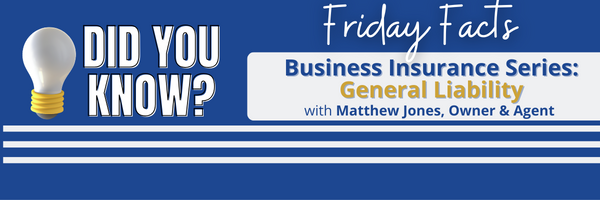by Morgan Timko | Feb 5, 2024 | Business Insurance, Did You Know?
Owner and Agent Matthew Jones discusses the details of commercial property and the necessary insurance to protect your assets. https://youtu.be/WvdNzYrA94kThe importance of Commercial Property InsuranceCommercial property insurance is a type of insurance policy that...

by Morgan Timko | Jan 12, 2024 | Business Insurance, Did You Know?
Watch to learn about the importance of general liability insurance for businesses. In this video, Owner and Agent Matthew Jones discusses the importance of general liability insurance for businesses. He explains how general liability covers more than just slip and...
by Morgan Timko | Nov 9, 2020 | Business Insurance
The Importance of Having the Right Workers’ Compensation Coverage For Your Business When you run a business, having the right insurance is extremely important. You can avoid so many financial burdens and protect your budget when you work with us for business insurance...
by Morgan Timko | Oct 14, 2020 | Business Insurance
What you need to know about remote working risks The coronavirus (COVID-19) pandemic has suddenly turned working from home from a privilege to a necessity. While you’re helping keep employees healthy and productive (and employed), you must also consider the potential...
by Morgan Timko | Sep 1, 2020 | Business Insurance
Professional liability and errors and omissions insurance both protect businesses from expensive lawsuits caused by unsatisfactory work. The language used may differ by industry. Professional liability vs. E&O vs. malpractice insurance Many industries use the...
by Morgan Timko | Aug 7, 2020 | Auto Insurance, Business Insurance
Types of Fleet Insurance Coverage Both federal and state laws require all fleet vehicles to have commercial fleet insurance, specifically liability insurance. This covers bodily injury, property damage or a combination in the event your drivers are at fault for any...


